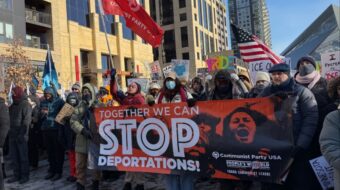
When it comes to workers’ rights, the National Labor Relations Board (NLRB) is casting a very jaundiced eye at forced arbitrations.
In a long string of recent rulings on the issue, covering enterprises ranging from the giant CVS pharmacy chain down to a pizza parlor in Brooklyn, the board majority is declaring that employers’ decisions to force individual workers to sign agreements with binding arbitration clauses also mean the workers are signing away their labor law rights, illegally.
And especially, the board adds, the forced arbitration clauses take away not just the workers’ rights under labor law, but also their right to file class action suits, too.
“If you have signed an employment contract in the past 15 years, the chances are good that you also signed away your rights to sue your employer if you get fired for bad reasons or feel that you have been discriminated against at work,” warned a Greenbelt, Md., labor law firm, Joseph, Greenwald and Peake, in a blog on a legal website, Findlaw.
“If you signed this agreement, then you agreed not to pursue any legal action against your employer in court. Instead, any disputes that you have with your employer must be settled through a process known as arbitration,” the blog added.
The board doesn’t like such arbitrations, and their exclusion of workers’ rights. After all, many arbitration agreements let the employer pick the arbitrator – although sometimes both sides must agree on a “neutral” person – and the arbitrator’s decision is final.
And implicit in the arbitration agreement is that if the worker – especially a prospective hiree-refuses to sign, the worker will lose the job.
That combination of coerciveness and threat to workers’ rights raises the NLRB’s hackles, or at least the hackles of its majority. GOP NLRB member Phillip Miscimarra has dissented in every case tossing out arbitration clauses.
The most notable one was a decision involving a San Mateo, Calf., solar panel manufacturer, Solar City. There, the board said that worker Anita Beth Irving – and, in other cases, other individual workers – had the right to sue in class actions in state court.
The firm claimed that its arbitration clause still let individual workers take their cases to the NLRB, the Equal Employment Opportunity Commission and other federal agencies, making it legal by letting the worker seek justice at higher levels. The board replied that Solar’s arbitration-only section still broke labor law, because it banned class actions, too.
Irving took her claim that Solar City broke wage and hour laws against her and other workers to local Superior Court. The firm invoked the arbitration clause to try to defeat her.
The NLRB bounced Solar City’s claims, just as it has in the other arbitration cases.
Labor law protection of workers to collectively organize “has long been held to encompass the right of employees to join together to improve their terms and conditions of employment through litigation,” the board majority, led by Chairman Mark Gaston Pearce, said.
“Accordingly, an employer violates Section 8(a)(1)” – the key section of the National Labor Relations Act – “by compelling employees, as a condition of employment, to waive their right to ‘collectively pursue litigation of employment claims in all forums, arbitral and judicial.’
“The board made it clear an employer may lawfully maintain an arbitration agreement that requires arbitral proceedings to be conducted individually, but only ‘so long as the employer leaves open a judicial forum for class and collective claims,'” Pearce wrote.
The board’s administrative law judges have been ruling the same way. The CVS case, involving pharmacist Kenneth Sternfeld at its Lindenhurst, N.Y., store, is typical.
NLRB Administrative Law Judge Lauren Esposito ruled in early December, a year after Sternfeld brought the case, that CVS broke labor law and took away Sternfeld’s rights to a class action suit. CVS said Dec. 30 it will appeal Esposito’s ruling to the full board.
The board’s general counsel argued CVS’ arbitration policy was so broad that it violates Sternfeld’s rights – and those of all other CVS workers nationwide. Esposito agreed.
“I find that respondents’ (CVS’s) arbitration policy violates” the National Labor Relations Act “under case law,” Esposito wrote. CVS’ “arbitration policy requires that all claims arising out of the employment relationship or its termination be adjudicated via arbitration, and provides for a waiver of all joint, class or collective claims.” And CVS’ policy orders that all workplace disputes of any type must go to individual-worker-vs.-CVS arbitration.
And CVS’ policy, like the others, says claims “may not be brought, heard or arbitrated as a class, collective representative, or private attorney general action.” That breaks labor law, Esposito said.
Worse, she ruled, Sternfeld was forced to agree to the arbitration if he wanted to win the pharmacy job in 2008. In so many words, she called CVS’ opt-out-of-arbitration provisions a sham – even though Sternfeld hasn’t complained yet. All he did was write to CVS, 30 days after completing its new and mandatory arbitration course in 2014, saying he wanted to opt out.
CVS said its opt-out-of-arbitration exception includes a ban on other workers or managers retaliating against a worker who opts out. It did not say anything about whether opting out could lead the firm to fire – or not hire – a worker in the first place.
“The opt-out provisions…do not establish the arbitration policy is not a mandatory condition of employment, and do not otherwise obviate the policy’s coercive character under existing (National Labor Relations) Board law,” Esposito declared.
Photo: Alliance for Justice










